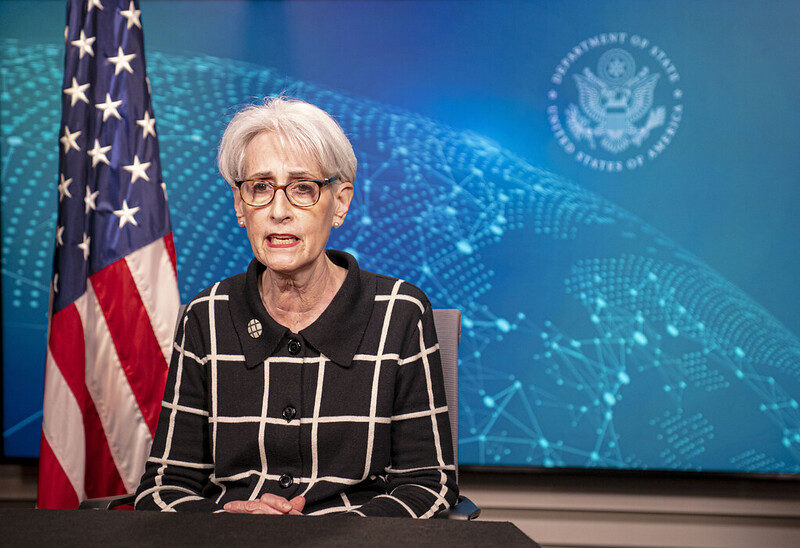The U.S. will not bar Ukraine or other countries from future entry into NATO, and any concessions with Russia on missile defense or military exercises must be “reciprocal,” State Department Deputy Secretary Wendy R. Sherman told journalists on a press call following eight hours of meetings with her Russian counterpart in Geneva on Jan. 10.
The meeting was the third U.S. Russia Strategic Stability Dialogue since President Joe Biden met with Russian President Vladimir Putin in Switzerland in June 2021. The Jan. 10 meeting took place as Russia maintains more than 100,000 troops along Ukraine’s border. On Dec. 17, Russia published and shared with the Biden administration a series of demands, including that NATO withdraw missile defenses and troops from the eastern flank of the alliance. Sherman called the conditions “non-starters,” but she highlighted areas that are possible.
“The preliminary ideas the United States raised today include missile placement,” Sherman told journalists some 30 minutes after concluding her meeting.
U.S. proposals about the possibility of relocating missiles in Europe are consistent with the now-defunct Intermediate-Range Nuclear Forces (INF) Treaty, which expired in August 2019. The U.S. is also willing to discuss limits on military exercises and training if Russia commits to the same.
“We shared that we are also open to discussing ways we can set reciprocal limits on the size and scope of military exercises and to improve transparency about those exercises, again on a reciprocal basis,” Sherman added, noting that the topic will be brought up again during the NATO-Russia Council meeting Jan. 12. That meeting will also be led by Sherman. On Jan. 13, Russia is set to meet with the Organization for Security and Cooperation in Europe, which monitors compliance with the Minsk agreement and the conflict in eastern Ukraine.
Sherman said Russia consistently referred to the draft treaties it had shared with the Biden administration, which also barred future NATO membership by Ukraine and Georgia and called for ending defense cooperation with the aspiring NATO countries.
“We were firm, however, in pushing back on security proposals that are simply non-starters for the United States,” Sherman said. “We will not allow anyone to slam closed NATO’s ‘open door’ policy, which has always been central to the NATO Alliance.”
Sherman said the United States would not negotiate about NATO, the European Union, or countries such as Ukraine without their participation.
Instead, America’s No. 2 diplomat called on Russia to de-escalate and allow for diplomacy.
“We made it very clear that it’s very hard to have constructive, productive, and successful diplomacy without de-escalation,” she said. “We will see whether, in fact, Russia understands that the best way to pursue diplomacy is for them to reduce those tensions and to de-escalate. We’ll see how serious they are.”
DOD Delegates on Hand
At the Pentagon, Press Secretary John F. Kirby said there had been no meaningful reduction in the number of Russian troops poised on the Ukraine border but acknowledged that DOD was aware of the discussions regarding missile placement.
“We were certainly aware and supportive of the effort to be able to talk about missile capabilities on the European continent as one thing that the administration would be willing to look at,” Kirby said, adding that “some level of reciprocity” by Russia would be expected. Russia is known to have robust anti-access/area denial (A2AD) capabilities on the Baltic Sea in the exclave of Kaliningrad and in the Black Sea in occupied Crimea.
Accompanying Sherman were two delegates from DOD: Joint Chiefs of Staff Director of Operations Lt. Gen. James J. Mingus and Deputy Assistant Secretary of Defense for Russia, Ukraine, Eurasia Laura K. Cooper.
“We want to see the tensions de-escalate, certainly want to see the violence stop,” Kirby said of the low-intensity conflict that persists between Ukraine and Russia-backed separatists in southeastern Ukraine.
“It’s clear that Ukrainian troops are in a hot war every single day in that area in the Donbass region,” he added. “It’s important for the Russians to observe the Minsk agreements, to pull back, and to cease the violence.”
Russia, for its part, indicated at the meeting that its heavy troop and capability presence on Ukraine’s border was not a pretext for invasion, Sherman said.
“Russia indeed said to us, as they said publicly, they do not intend to invade. These are just maneuvers and exercises. But I would note that none of this was notified to anyone,” she said. “They can prove that, in fact, they have no intention by de-escalating and returning troops to barracks.”
Following a last-minute visit to Washington by Ukrainian Defense Minister Oleksii Reznikov in November 2021, when he requested aerial defense systems, the Pentagon sent an air defense team to Ukraine to evaluate the country’s need.
Kirby said Jan. 10 that team had been “back a while” but that no formal recommendation has yet been lodged. Ukraine says it needs the air defenses to deter a Russian invasion.
The Biden administration has threatened heavy economic sanctions, reinforcement of NATO’s force posture in the east, and additional security assistance to Ukraine should Russia further invade the country.
Sherman said complex issues such as arms control are lengthy processes and were not negotiated at the meeting.
“This was not a negotiation, so we were putting ideas on the table today. And we have a long way to go,” she said. “We didn’t set out a specific timetable for anything. “
